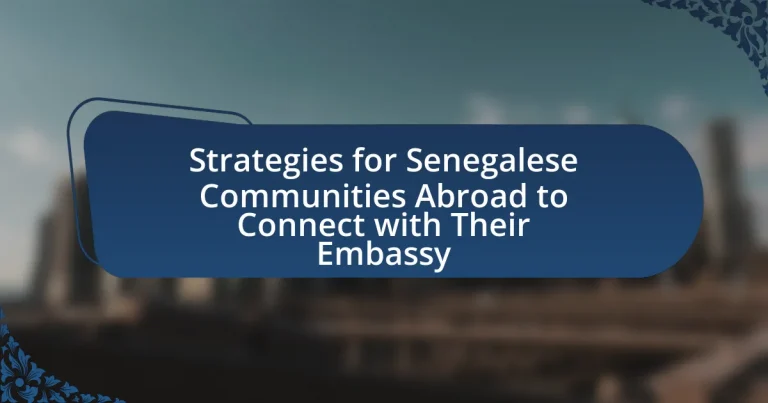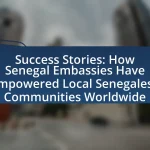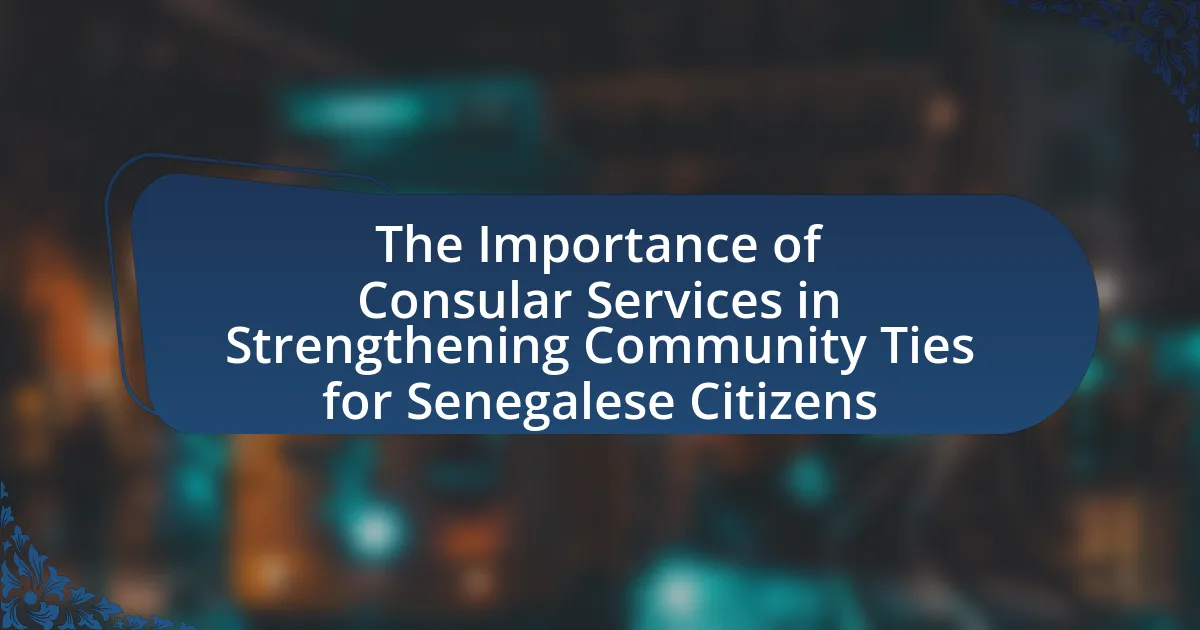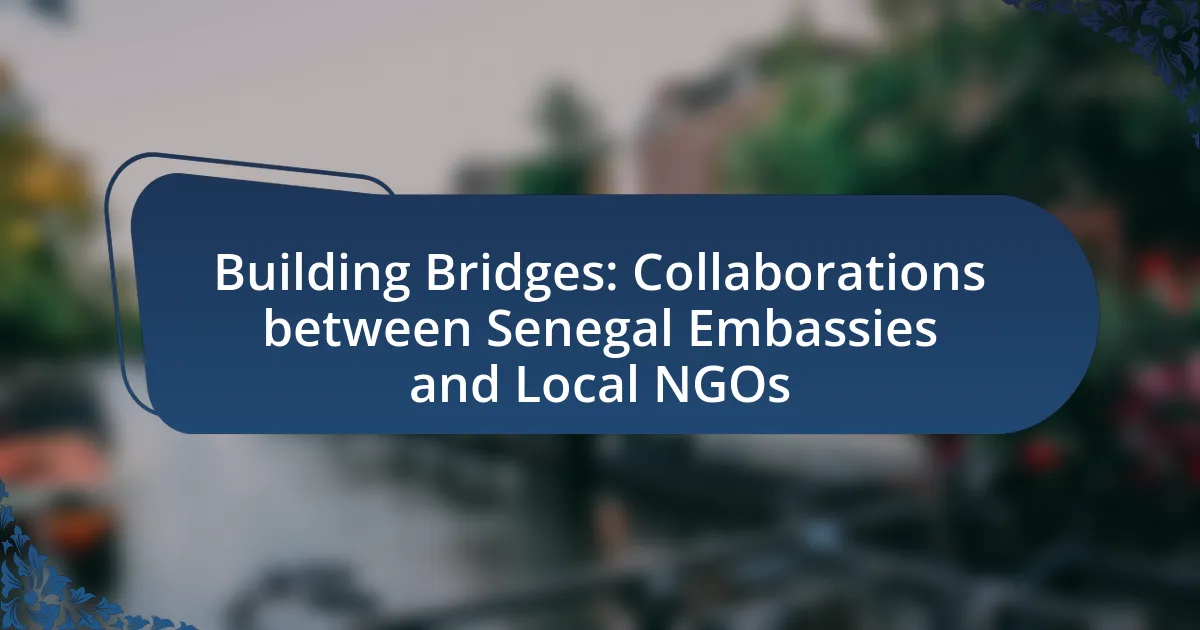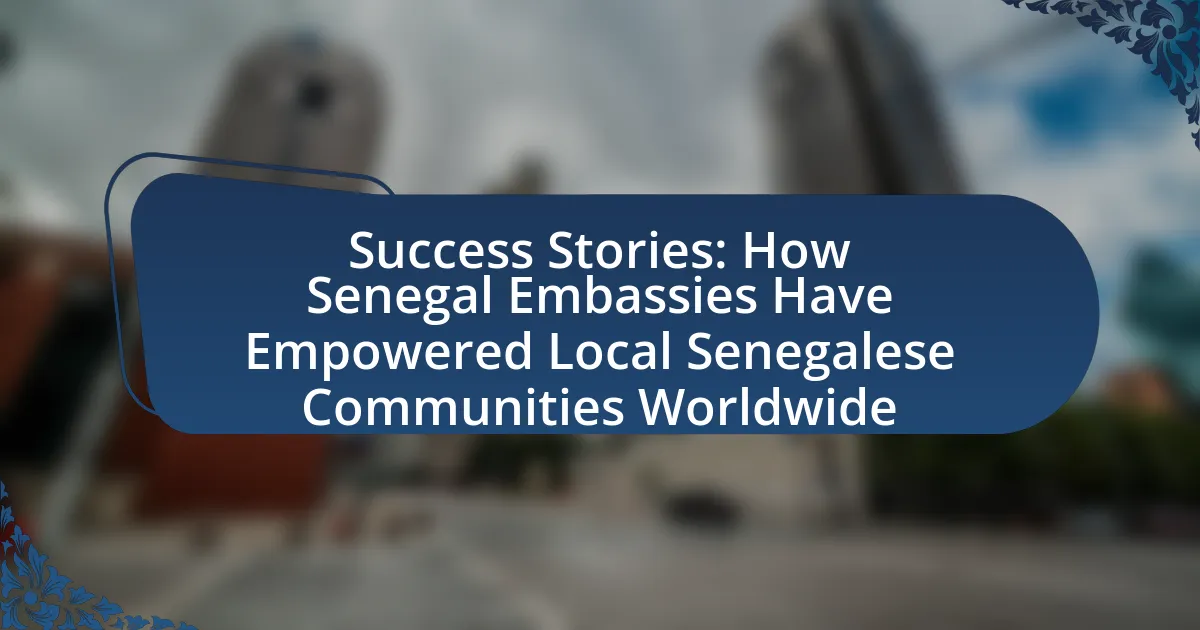The article focuses on strategies for Senegalese communities abroad to effectively connect with their embassy. It outlines key methods such as organizing community events, utilizing digital communication platforms, and participating in local governance to enhance engagement. The article also discusses how to identify local embassies, the role of technology in communication, and the importance of community organization. Additionally, it addresses challenges faced by these communities, including language barriers and bureaucratic inefficiencies, while providing practical tips for improving communication and fostering relationships with embassy representatives.
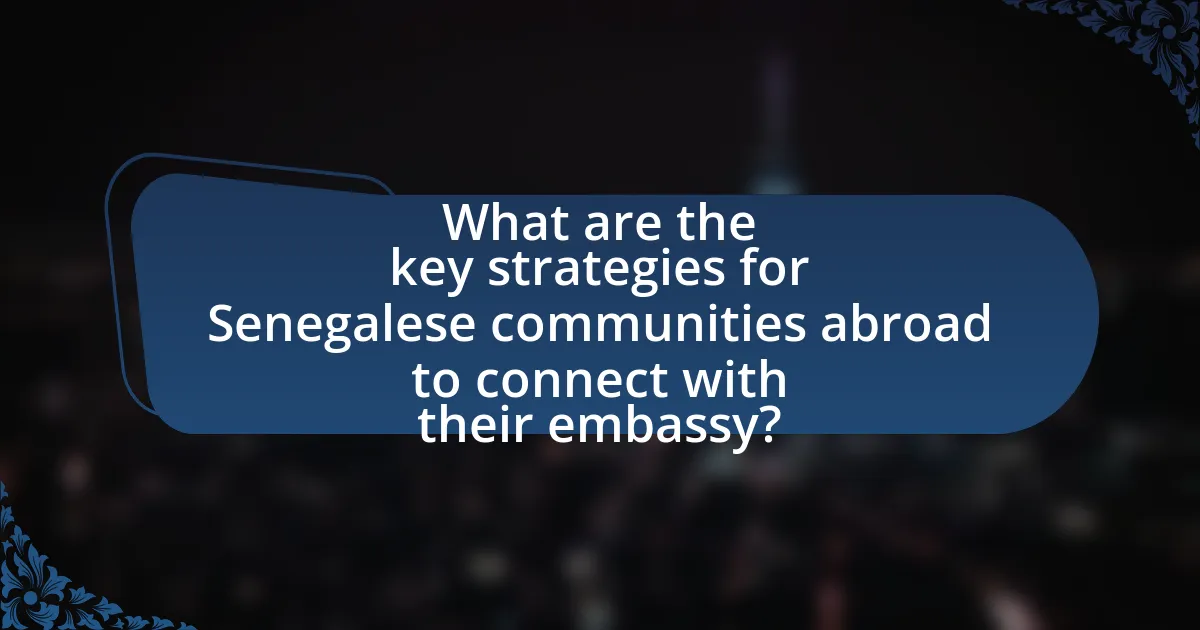
What are the key strategies for Senegalese communities abroad to connect with their embassy?
Senegalese communities abroad can effectively connect with their embassy through organized community events, digital communication platforms, and active participation in local governance. Organizing community events, such as cultural festivals or informational meetings, fosters direct interaction with embassy representatives, allowing for the exchange of information and resources. Utilizing digital communication platforms, including social media and official embassy websites, enables timely updates and engagement on consular services and community issues. Additionally, active participation in local governance, such as attending town hall meetings or forming associations, helps amplify the community’s voice and strengthens ties with the embassy, ensuring that their needs and concerns are addressed.
How can Senegalese communities identify their local embassy or consulate?
Senegalese communities can identify their local embassy or consulate by visiting the official website of the Senegalese Ministry of Foreign Affairs, which provides a comprehensive list of diplomatic missions worldwide. This website includes contact information, addresses, and services offered by each embassy or consulate. Additionally, communities can reach out to local Senegalese associations or organizations, which often have updated information about the nearest diplomatic representation. The Ministry of Foreign Affairs regularly updates its listings to ensure accuracy, making it a reliable resource for Senegalese citizens abroad.
What resources are available for locating Senegalese embassies worldwide?
The primary resource for locating Senegalese embassies worldwide is the official website of the Ministry of Foreign Affairs of Senegal, which provides a comprehensive list of all diplomatic missions. Additionally, the Senegalese government maintains an online directory that includes contact information and addresses for each embassy and consulate. This information is regularly updated to ensure accuracy, making it a reliable source for individuals seeking assistance or information from their local Senegalese embassy.
How can community leaders facilitate this identification process?
Community leaders can facilitate the identification process by organizing outreach programs that connect Senegalese citizens abroad with their embassy. These programs can include informational workshops, cultural events, and community meetings that raise awareness about the services provided by the embassy and the importance of maintaining ties with their home country. By leveraging local networks and utilizing social media platforms, community leaders can effectively disseminate information and encourage participation. This approach is supported by the fact that community engagement has been shown to enhance communication and foster a sense of belonging among expatriates, thereby increasing their likelihood of identifying with and utilizing embassy resources.
What role does technology play in connecting with the embassy?
Technology facilitates efficient communication between Senegalese communities abroad and their embassy by providing various digital platforms for interaction. These platforms include official embassy websites, social media channels, and mobile applications, which enable citizens to access information, services, and support quickly. For instance, the use of social media allows embassies to disseminate important updates and engage with the diaspora in real-time, enhancing connectivity and responsiveness. Additionally, online appointment systems streamline consular services, making it easier for individuals to schedule visits and obtain necessary documentation. This technological integration not only improves accessibility but also fosters a sense of community among Senegalese citizens living abroad.
How can social media be utilized for communication with the embassy?
Social media can be utilized for communication with the embassy by providing a platform for direct interaction, information dissemination, and community engagement. Embassies often maintain official accounts on platforms like Twitter, Facebook, and Instagram, where they share updates, respond to inquiries, and engage with citizens. For instance, the U.S. Embassy in Senegal uses its social media channels to announce events, provide consular services information, and address questions from the Senegalese community abroad. This approach enhances accessibility and fosters a sense of connection between the embassy and its citizens, allowing for timely communication and support.
What online platforms are effective for engaging with embassy services?
Effective online platforms for engaging with embassy services include official embassy websites, social media channels like Facebook and Twitter, and email communication. Official embassy websites provide essential information and services, such as visa applications and consular assistance. Social media channels allow for real-time updates and direct interaction with embassy representatives, enhancing communication. Email communication serves as a formal method for inquiries and requests, ensuring that citizens can reach out for assistance. These platforms collectively facilitate efficient engagement between Senegalese communities abroad and their embassy.
Why is community organization important for effective communication?
Community organization is crucial for effective communication because it fosters a structured environment where information can be shared efficiently among members. When communities are organized, they create channels for dialogue, ensuring that voices are heard and concerns are addressed. For instance, organized community groups can facilitate meetings, distribute newsletters, and utilize social media platforms to disseminate important updates, thereby enhancing engagement and participation. Research indicates that well-organized communities are more likely to achieve their communication goals, as they can mobilize resources and coordinate efforts effectively, leading to improved relationships with institutions such as embassies.
How can community groups enhance their outreach to the embassy?
Community groups can enhance their outreach to the embassy by establishing regular communication channels and organizing community events that invite embassy representatives. By creating structured platforms for dialogue, such as town hall meetings or cultural festivals, community groups can facilitate direct engagement with embassy staff, ensuring that their concerns and needs are effectively communicated. Evidence of successful outreach can be seen in various diaspora communities that have utilized similar strategies, resulting in increased embassy responsiveness and support for community initiatives.
What are the benefits of forming a formal association for Senegalese abroad?
Forming a formal association for Senegalese abroad provides numerous benefits, including enhanced community support, representation, and access to resources. These associations facilitate networking among members, allowing individuals to share experiences and provide assistance in navigating challenges related to living in a foreign country. Additionally, formal associations can serve as a unified voice to advocate for the interests of Senegalese citizens, ensuring their concerns are addressed by local authorities and the Senegalese government. Research indicates that organized communities are more effective in securing funding and resources, which can lead to cultural events, educational programs, and social services that benefit all members.
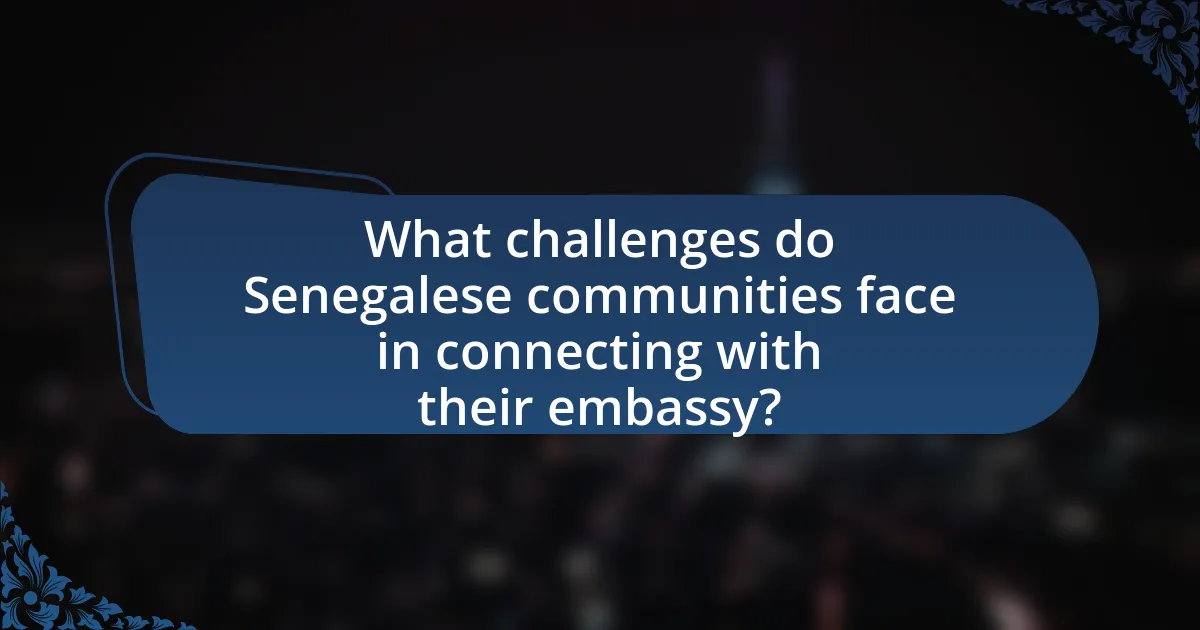
What challenges do Senegalese communities face in connecting with their embassy?
Senegalese communities face significant challenges in connecting with their embassy, primarily due to language barriers, limited access to information, and bureaucratic inefficiencies. Language barriers hinder effective communication, as many community members may not be fluent in French, the official language of Senegal. Limited access to information about embassy services and procedures can lead to confusion and frustration, as many individuals may not be aware of their rights or the resources available to them. Bureaucratic inefficiencies, such as long wait times and complex processes for obtaining documents, further complicate interactions with the embassy. These challenges can result in a lack of trust and engagement between Senegalese communities and their diplomatic representatives.
What barriers exist in communication between the embassy and communities abroad?
Barriers in communication between the embassy and communities abroad include language differences, cultural misunderstandings, and limited access to information. Language differences can hinder effective dialogue, as not all community members may be fluent in the embassy’s official language, leading to misinterpretations. Cultural misunderstandings can arise from differing social norms and practices, which may affect how messages are conveyed and received. Additionally, limited access to information, such as the lack of outreach programs or digital communication platforms, restricts community awareness of embassy services and initiatives. These barriers can significantly impede the establishment of a strong connection between the embassy and its diaspora.
How do language differences impact the connection with the embassy?
Language differences significantly hinder effective communication between individuals and their embassy. When citizens cannot communicate in the official language of the embassy, they may struggle to access vital services, understand legal requirements, or convey their needs accurately. For instance, a study by the International Organization for Migration highlights that language barriers can lead to misunderstandings, resulting in delays in processing requests or even denial of services. This underscores the importance of language accessibility in fostering a strong connection between Senegalese communities abroad and their embassy.
What logistical issues can hinder effective communication?
Logistical issues that can hinder effective communication include inadequate infrastructure, time zone differences, and language barriers. Inadequate infrastructure, such as unreliable internet connectivity or lack of access to communication tools, can prevent timely exchanges of information. Time zone differences can lead to delays in responses and misalignment in scheduling meetings or events. Language barriers may result in misunderstandings or misinterpretations of messages, further complicating communication efforts. These factors collectively impede the ability of Senegalese communities abroad to effectively connect with their embassy.
How can these challenges be overcome?
To overcome the challenges faced by Senegalese communities abroad in connecting with their embassy, establishing regular communication channels is essential. This can be achieved through the implementation of digital platforms, such as dedicated websites and social media channels, which facilitate real-time updates and engagement. For instance, the Senegalese government can utilize platforms like WhatsApp or Facebook to disseminate information and gather feedback from citizens abroad, enhancing accessibility and responsiveness. Additionally, organizing community outreach programs and events can foster direct interaction between embassy officials and expatriates, thereby strengthening relationships and addressing specific concerns. Evidence from successful diaspora engagement strategies in other countries, such as the Philippines, demonstrates that proactive communication and community involvement significantly improve the connection between citizens and their embassies.
What strategies can communities implement to improve communication?
Communities can implement regular town hall meetings to improve communication. These meetings facilitate direct dialogue between community members and leaders, allowing for the exchange of ideas, concerns, and updates. Research shows that communities that engage in consistent face-to-face interactions report higher levels of trust and satisfaction among members, which enhances overall communication effectiveness. Additionally, utilizing digital platforms such as social media groups can further strengthen communication by providing a space for ongoing discussions and information sharing, as evidenced by studies indicating that online engagement increases community cohesion and participation.
How can embassies better support their citizens abroad?
Embassies can better support their citizens abroad by enhancing communication channels and providing tailored services. Improved communication can include regular updates through social media, newsletters, and dedicated apps that inform citizens about local laws, safety tips, and embassy services. Tailored services may involve offering legal assistance, emergency support, and cultural integration programs that address the specific needs of Senegalese communities. For instance, the U.S. Department of State has implemented programs that assist citizens in crisis situations, demonstrating the effectiveness of proactive support measures.
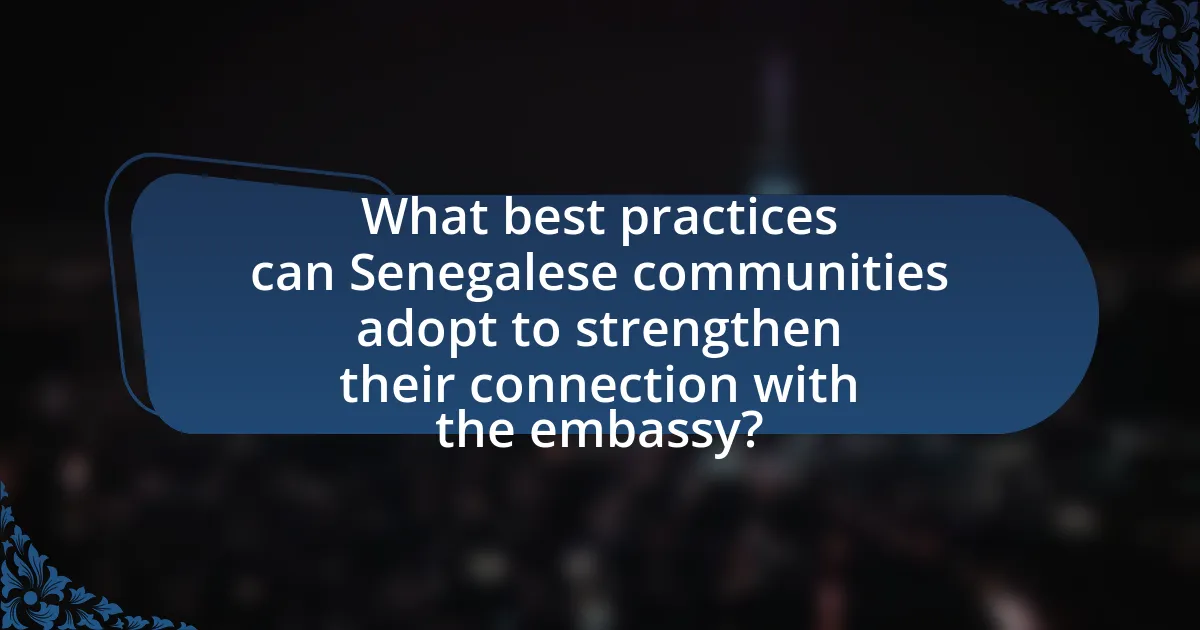
What best practices can Senegalese communities adopt to strengthen their connection with the embassy?
Senegalese communities can strengthen their connection with the embassy by establishing regular communication channels, such as community meetings and newsletters. These practices facilitate direct dialogue between community members and embassy representatives, ensuring that concerns and needs are addressed promptly. For instance, organizing quarterly town hall meetings allows for the exchange of information regarding consular services, cultural events, and community support initiatives. Additionally, utilizing social media platforms to share updates and engage with the embassy can enhance visibility and foster a sense of belonging among community members. This approach is supported by the fact that active engagement has been shown to improve trust and collaboration between embassies and diaspora communities, as evidenced by successful outreach programs in various countries.
How can regular engagement with embassy staff be maintained?
Regular engagement with embassy staff can be maintained through consistent communication channels, such as scheduled meetings, newsletters, and social media updates. Establishing a routine for these interactions fosters a sense of community and ensures that embassy staff remain accessible to the Senegalese diaspora. For instance, the use of digital platforms like WhatsApp or Facebook groups can facilitate real-time communication and information sharing, which has been shown to enhance engagement among expatriate communities. Additionally, organizing cultural events or forums can provide opportunities for face-to-face interactions, reinforcing relationships and encouraging ongoing dialogue between embassy staff and community members.
What types of events can facilitate better relationships with embassy representatives?
Networking events, cultural festivals, and community forums can facilitate better relationships with embassy representatives. These events provide opportunities for direct interaction, allowing community members to engage with embassy staff in a more informal setting. For instance, cultural festivals often showcase national heritage, fostering a sense of pride and connection that embassy representatives can appreciate and support. Additionally, networking events enable discussions on community issues, allowing embassy representatives to understand the needs and concerns of their citizens abroad. Community forums can also serve as platforms for dialogue, where embassy representatives can share resources and information, further strengthening the relationship.
How can feedback mechanisms be established for ongoing communication?
Feedback mechanisms can be established for ongoing communication by implementing structured channels such as surveys, regular meetings, and digital platforms. These channels facilitate the collection of input from community members, ensuring their voices are heard and considered in embassy decisions. For instance, utilizing online surveys can yield quantitative data on community needs, while regular town hall meetings can foster direct dialogue between embassy representatives and citizens. Research indicates that effective feedback loops enhance engagement and trust, as evidenced by a study from the International Journal of Public Administration, which found that communities with established feedback mechanisms reported higher satisfaction with governmental services.
What resources and tools are available for effective communication?
Effective communication resources and tools include digital platforms, social media, and community engagement initiatives. Digital platforms such as email and video conferencing tools like Zoom facilitate direct communication between Senegalese communities abroad and their embassy. Social media channels, including Facebook and Twitter, allow for real-time updates and interaction, fostering a sense of community and connection. Community engagement initiatives, such as town hall meetings and cultural events, provide opportunities for face-to-face dialogue, enhancing understanding and collaboration. These tools are essential for maintaining a strong relationship between the Senegalese diaspora and their embassy, ensuring that information is shared efficiently and effectively.
How can newsletters and community bulletins be used to share information?
Newsletters and community bulletins can be effectively used to share information by providing regular updates on embassy services, community events, and important announcements. These communication tools facilitate the dissemination of relevant information directly to the Senegalese diaspora, ensuring they remain informed about their rights, resources, and opportunities available through the embassy. For instance, newsletters can include details about consular services, cultural events, and community support initiatives, thereby fostering a sense of connection and engagement among community members. Additionally, studies show that consistent communication through newsletters increases community participation and awareness, making them a vital resource for maintaining ties between Senegalese communities abroad and their embassy.
What role do workshops and informational sessions play in community engagement?
Workshops and informational sessions serve as vital tools for enhancing community engagement by facilitating direct communication and knowledge sharing among community members and their representatives. These interactive platforms allow participants to express their needs, concerns, and aspirations, fostering a sense of belonging and collective identity. For instance, research indicates that community workshops can increase participation rates by up to 40%, as they create an inclusive environment where individuals feel empowered to contribute. Additionally, informational sessions provide essential resources and updates about embassy services, thereby strengthening the connection between Senegalese communities abroad and their embassy. This two-way communication not only builds trust but also encourages active involvement in community initiatives, ultimately leading to more effective representation and support for the diaspora.
What practical tips can enhance the connection with the embassy?
To enhance the connection with the embassy, Senegalese communities abroad should actively participate in embassy-hosted events and engage in regular communication with embassy staff. Attending cultural events, workshops, and informational sessions organized by the embassy fosters relationships and provides opportunities for direct interaction. Additionally, utilizing social media platforms to follow and engage with the embassy’s official accounts can keep communities informed about services and initiatives. Regularly reaching out via email or phone for inquiries or assistance also establishes a rapport, demonstrating the community’s interest in maintaining a connection. These strategies are effective as they create a two-way communication channel, allowing for better representation and support of the community’s needs.
How can individuals prepare for meetings with embassy officials?
Individuals can prepare for meetings with embassy officials by researching the embassy’s services, understanding the specific issues they wish to discuss, and gathering necessary documentation. Researching the embassy’s services ensures individuals are aware of what assistance is available, such as visa applications or legal support. Understanding the specific issues allows individuals to articulate their needs clearly, making the meeting more productive. Gathering necessary documentation, such as identification and relevant forms, is crucial as it provides the officials with the information needed to assist effectively. This preparation enhances communication and increases the likelihood of a successful outcome during the meeting.
What common mistakes should be avoided when reaching out to the embassy?
Common mistakes to avoid when reaching out to the embassy include failing to provide clear and concise information, neglecting to research the embassy’s specific services, and not following proper communication protocols. Clear and concise information is essential because embassies handle numerous inquiries daily, and vague requests can lead to misunderstandings or delays. Researching the embassy’s services ensures that individuals direct their inquiries appropriately, as each embassy may have different processes and resources available. Following proper communication protocols, such as using formal language and addressing the appropriate department, is crucial for effective communication and demonstrates respect for the embassy’s procedures.
